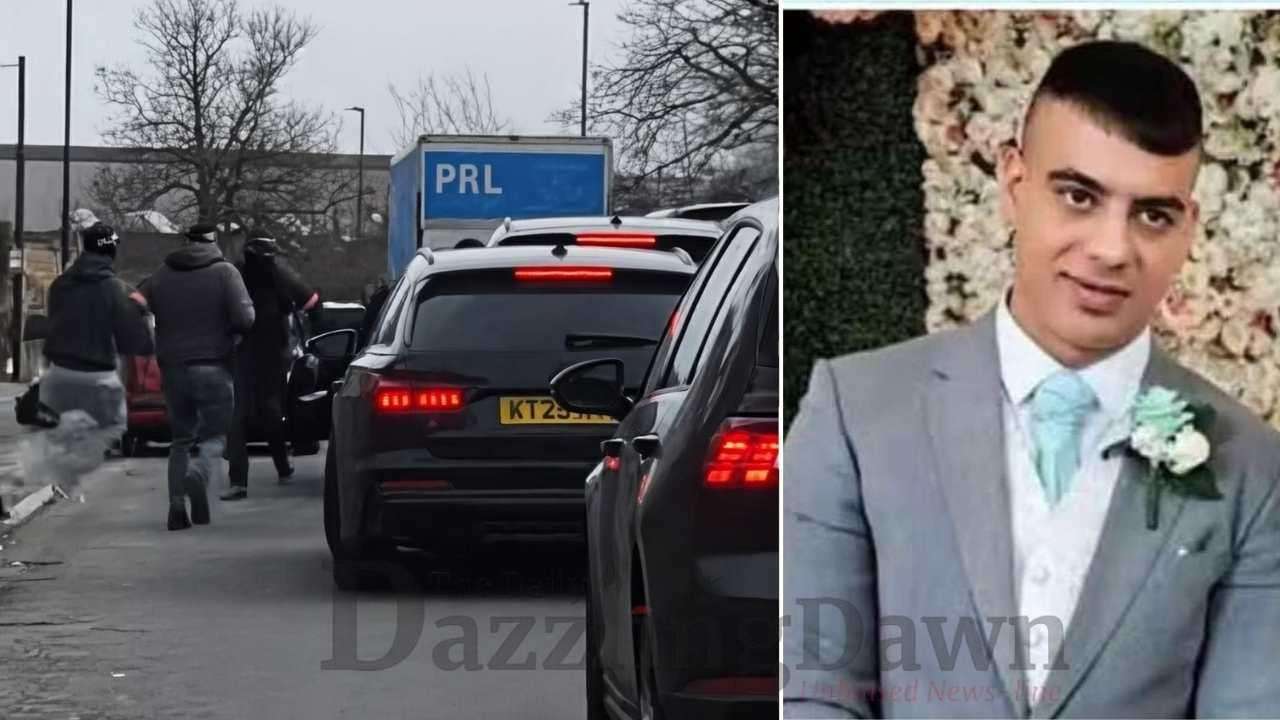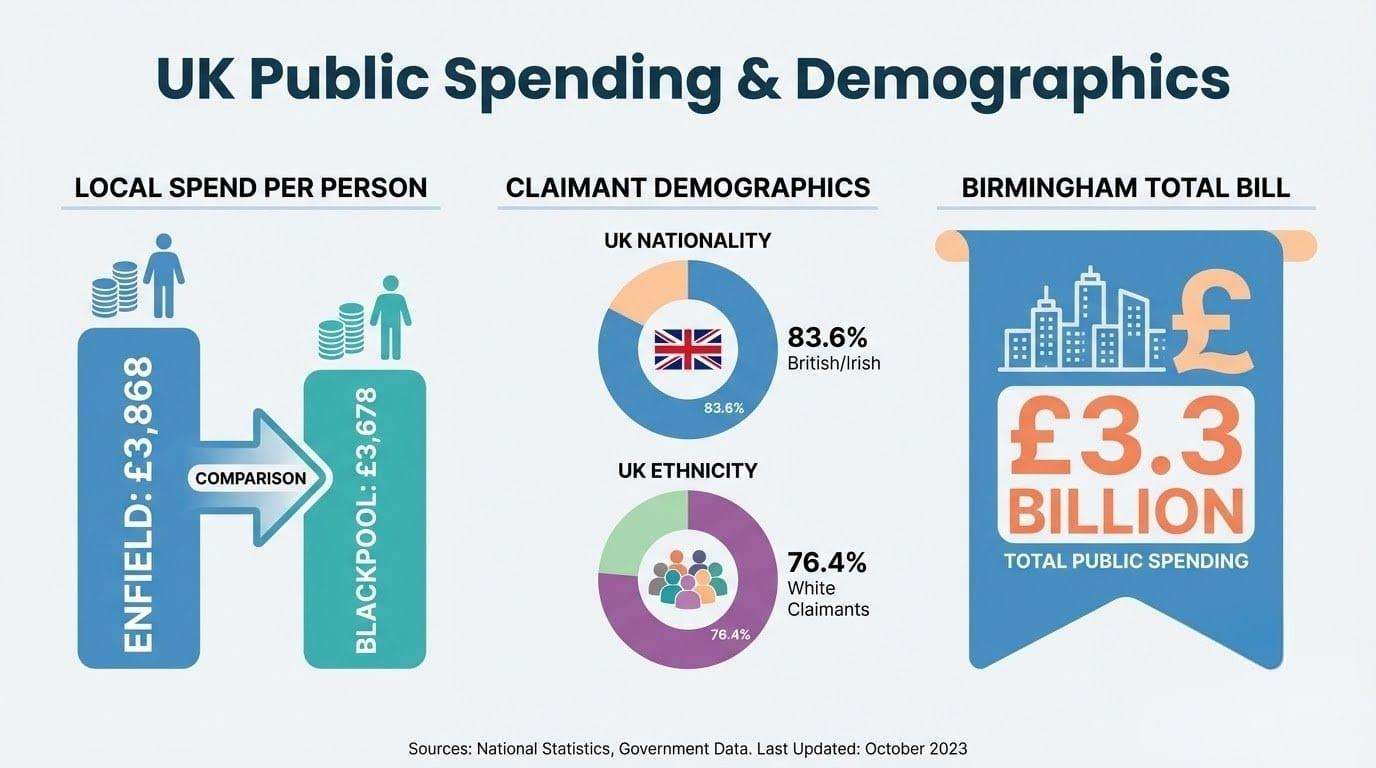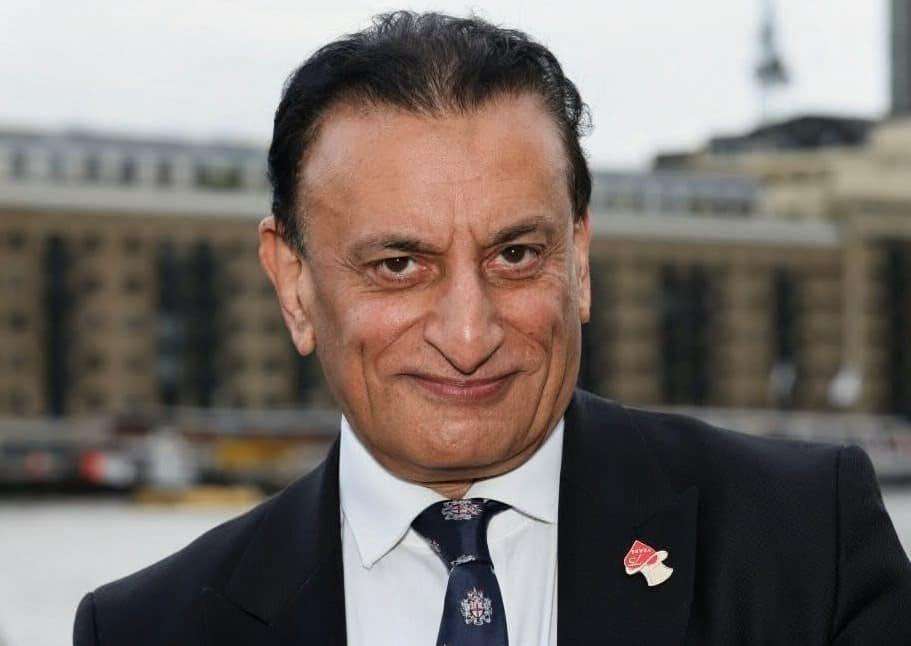
Fashion designer Kazna Asker is a British Muslim of Yemeni descent who grew up in Sheffield.
But when it comes to inspiration for looks that combine sportswear and Muslim basics, she doesn't have to look far.
"My main fashion inspiration is my family," she says.
"I'd see my grandma in a traditional hijab and abaya and my cousin sat next to her in a roadman tracksuit," she says.
The 26-year-old made her London Fashion Week (LFW) debut, showcasing her outfits in a show watched by journalists, her family and fashionistas.
Kazna wanted to bring the flavor of her homeland to the packed room, and models wearing outfits she designed stood at the entrance.
"All the clothes on the mannequins are what I would see in my community," she says.
"The combination of traditional, cultural dress with streetwear."
Traditional Yemeni tea and biscuits were served to the audience, and a self-directed documentary about Kezna's community filled the space.
Kezna says showing her work at such a prestigious event was a big moment, shining a spotlight on her work and her heritage.
"I know Fashion Week comes with a lot of clout, so I'm glad it's getting people's attention," she says.
An exhibition in London and screening of his film also gave Kazna the opportunity to highlight voices from Sheffield that might often go “unheard”.
Kazna talks about “individuals and champions for the city, teachers, city councilors, community activists.”
The documentary shows her going to her local council and challenging them about the lack of ethnic minority teachers.
And Kazna is also concerned about diversity in the fashion industry – something she believes needs to improve.
A 2022 British Fashion Council report found the industry's leadership remains dominated by men and white leaders, and "the fashion industry is not adequately prioritising diversity and inclusion".
The report also pointed to concerns that the lack of diversity at lower levels "speaks to the lack of a diverse talent pipeline in the industry".
Another barrier is money. Though Kazna made an impact at LFW this year, she feels it's difficult to break into fashion without connections or a lot of financial backing.
She was supported through a British Fashion Council fund designed to help emerging British designers.
"I think it is hard for fashion students to survive," she says.
"When I came to London for my postgrad, the costs were very high, but it was worth it.
"I got a lot of support in my designs and my tutors really believed in my message."
Kazna is also entering the world of casual streetwear, a growing fashion sector that is gradually attracting interest from companies like Nike.
But many in the Muslim community feel there is still a long way to go, she said, with limited options on the high street.
And she wants to continue making a difference with her creations.
"The fight in me comes from my Yemeni heritage," she says.
"My parents fought for everything they have now. That rebellious side of me comes out in my fashion."
For those wanting to break through despite facing barriers, Kazna has some advice.
"Don't be intimidated by a big city, always go back to your people and represent them," she says.
"Just rep your corner, people identify with that."
 Fashion designer Kazna Asker is a British Muslim of Yemeni descent who grew up in Sheffield.
But when it comes to inspiration for looks that combine sportswear and Muslim basics, she doesn't have to look far.
"My main fashion inspiration is my family," she says.
"I'd see my grandma in a traditional hijab and abaya and my cousin sat next to her in a roadman tracksuit," she says.
The 26-year-old made her London Fashion Week (LFW) debut, showcasing her outfits in a show watched by journalists, her family and fashionistas.
Kazna wanted to bring the flavor of her homeland to the packed room, and models wearing outfits she designed stood at the entrance.
"All the clothes on the mannequins are what I would see in my community," she says.
"The combination of traditional, cultural dress with streetwear."
Traditional Yemeni tea and biscuits were served to the audience, and a self-directed documentary about Kezna's community filled the space.
Kezna says showing her work at such a prestigious event was a big moment, shining a spotlight on her work and her heritage.
"I know Fashion Week comes with a lot of clout, so I'm glad it's getting people's attention," she says.
An exhibition in London and screening of his film also gave Kazna the opportunity to highlight voices from Sheffield that might often go “unheard”.
Kazna talks about “individuals and champions for the city, teachers, city councilors, community activists.”
The documentary shows her going to her local council and challenging them about the lack of ethnic minority teachers.
And Kazna is also concerned about diversity in the fashion industry – something she believes needs to improve.
A 2022 British Fashion Council report found the industry's leadership remains dominated by men and white leaders, and "the fashion industry is not adequately prioritising diversity and inclusion".
The report also pointed to concerns that the lack of diversity at lower levels "speaks to the lack of a diverse talent pipeline in the industry".
Another barrier is money. Though Kazna made an impact at LFW this year, she feels it's difficult to break into fashion without connections or a lot of financial backing.
She was supported through a British Fashion Council fund designed to help emerging British designers.
"I think it is hard for fashion students to survive," she says.
"When I came to London for my postgrad, the costs were very high, but it was worth it.
"I got a lot of support in my designs and my tutors really believed in my message."
Kazna is also entering the world of casual streetwear, a growing fashion sector that is gradually attracting interest from companies like Nike.
But many in the Muslim community feel there is still a long way to go, she said, with limited options on the high street.
And she wants to continue making a difference with her creations.
"The fight in me comes from my Yemeni heritage," she says.
"My parents fought for everything they have now. That rebellious side of me comes out in my fashion."
For those wanting to break through despite facing barriers, Kazna has some advice.
"Don't be intimidated by a big city, always go back to your people and represent them," she says.
"Just rep your corner, people identify with that."
Fashion designer Kazna Asker is a British Muslim of Yemeni descent who grew up in Sheffield.
But when it comes to inspiration for looks that combine sportswear and Muslim basics, she doesn't have to look far.
"My main fashion inspiration is my family," she says.
"I'd see my grandma in a traditional hijab and abaya and my cousin sat next to her in a roadman tracksuit," she says.
The 26-year-old made her London Fashion Week (LFW) debut, showcasing her outfits in a show watched by journalists, her family and fashionistas.
Kazna wanted to bring the flavor of her homeland to the packed room, and models wearing outfits she designed stood at the entrance.
"All the clothes on the mannequins are what I would see in my community," she says.
"The combination of traditional, cultural dress with streetwear."
Traditional Yemeni tea and biscuits were served to the audience, and a self-directed documentary about Kezna's community filled the space.
Kezna says showing her work at such a prestigious event was a big moment, shining a spotlight on her work and her heritage.
"I know Fashion Week comes with a lot of clout, so I'm glad it's getting people's attention," she says.
An exhibition in London and screening of his film also gave Kazna the opportunity to highlight voices from Sheffield that might often go “unheard”.
Kazna talks about “individuals and champions for the city, teachers, city councilors, community activists.”
The documentary shows her going to her local council and challenging them about the lack of ethnic minority teachers.
And Kazna is also concerned about diversity in the fashion industry – something she believes needs to improve.
A 2022 British Fashion Council report found the industry's leadership remains dominated by men and white leaders, and "the fashion industry is not adequately prioritising diversity and inclusion".
The report also pointed to concerns that the lack of diversity at lower levels "speaks to the lack of a diverse talent pipeline in the industry".
Another barrier is money. Though Kazna made an impact at LFW this year, she feels it's difficult to break into fashion without connections or a lot of financial backing.
She was supported through a British Fashion Council fund designed to help emerging British designers.
"I think it is hard for fashion students to survive," she says.
"When I came to London for my postgrad, the costs were very high, but it was worth it.
"I got a lot of support in my designs and my tutors really believed in my message."
Kazna is also entering the world of casual streetwear, a growing fashion sector that is gradually attracting interest from companies like Nike.
But many in the Muslim community feel there is still a long way to go, she said, with limited options on the high street.
And she wants to continue making a difference with her creations.
"The fight in me comes from my Yemeni heritage," she says.
"My parents fought for everything they have now. That rebellious side of me comes out in my fashion."
For those wanting to break through despite facing barriers, Kazna has some advice.
"Don't be intimidated by a big city, always go back to your people and represent them," she says.
"Just rep your corner, people identify with that."



.jpeg)



.svg)

